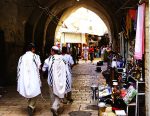This photograph by Ziv Koren is from My Jerusalem: The Eternal City, a collection of reflections on the city by notable Israeli and Diaspora (mainly American) Jews edited by Ilan Greenfield and published by Gefen Publishing House last year.
I read a lovely quotation recently: “I met a hundred people going to Delhi. And every one of them was my brother.” I often feel that way in Israel. In the 40 years I have lived here, I have met saints and sinners, business tycoons and homemakers, and many, many others. But, by the very fact of them pulling up their roots, leaving behind their birthplaces and culture, here they become ordinary people leading extraordinary lives. I once had a friend, sadly passed on, who used to say that he stood on the corner and watched all the poems walk by.
Israel makes demands on us. We don’t just drift along acquiring more and more material possessions – a bigger home, a more luxurious car, a wardrobe of designer clothing. No matter how rich or poor we may be, when our children turn 18, they are expected to serve their country, either in the Israel Defence Forces or national service (Sherut Leumi). Almost everyone I know is a mother, father, grandparent, sister, brother, wife or daughter of a soldier, and there is always the fear for their safety, or of terrorist attacks that can occur anywhere, changing lives forever. And the six-day work week doesn’t leave much time for leisure, or keeping up with friends and family scattered around the country. Yet there is a resilience here. On the whole, we are optimists. It is almost a cliché that, if you live in Israel and don’t believe in miracles, then you are not a realist. We live on miracles and expect them – the Entebbe rescue and the Six Day War victory are just two examples.
Stand on the corner of any Jerusalem street and, in the space of 10 minutes, you can hear several languages. There might be a monk in a long habit; a soldier whose face is etched in weariness; a teenager with earrings and tattoos; tourists with cameras slung around their necks; a housewife trundling a shopping cart; a Charedi Jew with peyot; and everywhere people talking on their mobile phones. A gregarious lot contributing to the rich mosaic of our society. Each one unique.
They may be strangers, but Israelis won’t hesitate to speak to you … on a bus, waiting in a queue, sitting at your doctor’s office. They may ask you where you bought your shoes, where you work, how much you earn, and why haven’t you dressed your child warmly enough. One big family. It’s not just idle curiosity – they are really interested.
This is what’s so endearing about living in Israel. We all express our identity differently, in the way we dress and the words we speak, but, in the end, it’s a similar identity. We are bonded by birth, by choice or by belief and it creates a link – invisible perhaps but, when needed, we will help each other. It’s an unspoken commitment. How lucky we are!
Dvora Waysman is a Jerusalem-based author. She has written 14 books, including The Pomegranate Pendant, which was made into a movie, and her latest novella, Searching for Sarah. She can be contacted at [email protected] or through her blog dvorawaysman.com.

